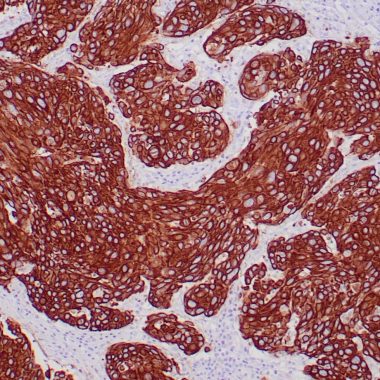Twenty human cytokeratins are resolved with two-dimensional gel electrophoresis into acidic (pI <5.7) and basic (pI >6.0) subfamilies. The acidic keratins have molecular weights of 56.5, 55, 51, 50, 50’, 48, 46, 45, and 40kDa. The basic keratins have molecular weights of 65-67, 64, 59, 58, 56 and 52kDa. Members of acidic and basic subfamilies are found together in pairs. The composition of keratin pairs varies with cell type, differentiation status and environment. Many studies have shown the usefulness of keratins as markers in cancer research and tumor diagnosis. MAb AE1 recognizes the 56.5, 50, 50’, 48, and 40kDa keratins of acidic subfamily, whereas the AE3 MAb reacts with the basic keratins of 65-67, 64, 59, 58, 56, and 52kDa. AE1/AE3 reacts with keratinized (56.5/65-67) and corneal (55/64) epidermis, stratified squamous epithelia of internal organs (51/59), stratified epithelia (50/58), hyperproliferative keratinocytes (48/56), and simple epithelia (45/52 and 46/54). AE1/AE3 is a broad-spectrum anti pan-keratin antibody cocktail which differentiates epithelial from non-epithelial tumors.

